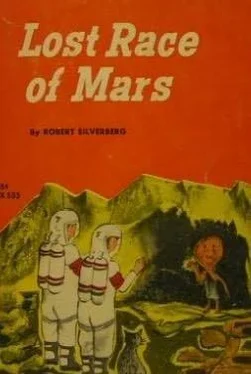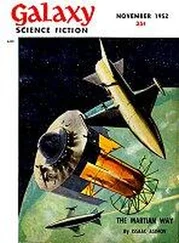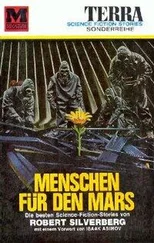“And we thought you had forgotten,” Jim said. “Because it was past eight o’clock and you hadn’t said anything about Surprise Day.”
“We were saving it,” Mrs. Chambers explained. “It was such a big surprise we wanted to hold it off until nighttime”
“It’s the only surprise we have, too,” Dr. Chambers added. “It’ll have to do—from both of us to both of you.”
“Have to do?” Jim echoed. “Why, it’s worth five years of surprises!”
“Now we’re forgetting,” Sally reminded him quietly.
“Oh—gosh, yes. Excuse us a second,” Jim said.
He and Sally scampered upstairs, took their gifts from hiding places, and ran downstairs.
Things like billfolds and cuff links and umbrellas and perfume were not in the same class with trips to Mars, but they were surprises all the same.
There was a flurry of unpacking and examining, and thanking. Everyone laughed when the collapsible umbrella was unpacked. “Here’s one thing I won’t be taking with me,” Mrs.
Chambers said.
“I guess you won’t, Mom,” Jim admitted. It hasn’t rained on Mars for thousands of years, and it isn’t likely to start now. But how was I supposed to know?”
“You weren’t,” his father said. “But the umbrella will come in handy when we come back to Earth. We aren’t going to be on Mars forever, you know.”
“Only a year,” Sally said wistfully. “That isn’t much time at all.”
“It is if it’s a Martian year,” Jim explained. “A Martian year is six hundred and eighty-seven Earth days long!”
“So it is,” Dr. Chambers agreed. “But I’m afraid my grant specifies one old-fashioned Earth year, three hundred and sixty-five years of twenty-four hour days.”
“What are we going to do about school?” Sally asked.
“It’s all arranged,” Mrs. Chambers said. “You’ll be going to classes every day at the Mars Colony school. You won’t miss any time at all. And when you come back to Earth you’ll go right into the grade you’re supposed to be in.”
A sudden thought occurred to Jim as the cat stirred in his corner and began washing his paws.
“Dad—does this grant of yours include cats?”
“I’m afraid not, son,” Dr. Chambers said, his smile disappearing. “We’ll have to leave Chipper behind. Maybe the Robinsons will agree to take care of him while we’re gone.”
“But a cat doesn’t take up much room,” Sally protested.
“That spoiled cat of yours weighs fourteen pounds, Sally. You’d shudder if you knew how much it costs to ship fourteen pounds of cute but useless cat all the way to Mars. And when he’s there, he’ll have to eat, breathe, and drink, won’t he? The Martian Colonists manufacture their own food, air, and water. These are very precious, and they aren’t going to like the idea of sharing them with Chipper, no matter how important he may be to you.”
Jim scratched the cat behind the ears. This attention usually produced a purr, but now resulted only in a cold stare. “See? He’s unhappy already. He knows what we’re talking about, Dad.”
“It wouldn’t matter even if he could read and write, too, Jim. He’ll have to stay behind.”
“I suppose you’re right,” Jim admitted. He stroked the tom’s silken fur. “So long, old fellow.
We’ll be back in a year. I guess we’ll miss you as much as you miss us, but it can’t be helped, Chipper.”
“Mrreow!”
“You know where we’re going, Chipper? We’re going to Mars. Do you know where that is?”
“Miuaouurk!”
“Come on,” Jim said. “I’ll give you a look at Mars.” Scooping the cat up, Jim walked through the front hall and stepped out on the front porch. He was aware that Sally and his parents were coming, too.
Jim searched the skies for a moment, until he found what he wanted, high in the star-dotted blackness. Mars stood out clearly, a gleaming, brick-red ball. Jim pointed to it. “See that up there, Chipper? That red-dish thing? That’s Mars. Mars! And we’re going to be there soon—all of us except you.”
“Mmnmeerk,” the cat said sadly.
Jim let the cat down. “Sorry, Chipper. There rules are the rules.”
The Chamberses went back inside. It was still hard to believe. “Gee, Dad,” Jim said, “this is the biggest surprise there could have been. Imagine—we’re going to Mars!”
The next five days were the most hectic the Chambers family had ever known. Many of the preparations for the trip had been made quietly in the past few weeks, ever since Dr.
Chambers had known definitely he was getting the grant, but there was still plenty of last-minute work—packing to do, letters to write, bills to pay. Relatives kept coming in person or calling by visiphone to wish the spacefarers a happy blast-off. Reporters came calling. It was a good human-interest story, “Professor and family off to Mars,” and every paper wanted to run something about it.
Although the reporters were a nuisance, the newspaper stories came in handy on the final day of school. Jim and Sally had told all their friends and classmates, of course. But not until the papers came out with the headlines about their trip did everyone really believe it. Suddenly Jim and Sally became the most important people in their school. Fore the first time in their lives Jim and Sally learned what it meant to be a celebrity. They weren’t sure they liked being at the center of so much noisy fuss and attention.
Packing was a hard job—not because they had so much to pack, but because they were allowed to take so little. The regulations allowed them only seventy pounds of baggage apiece, which was not very much at all for a years stay. But it wasn’t necessary to take clothes for different seasons because the artificial air of the Mars Colony dome was kept at the same temperature all year round, sixty-nine degrees. So spring clothes were all that they needed. And nothing fancy, either, since the colonists didn’t go in for frills and formalities.
Spaceships left for Mars only once a month. They carried mail for the colonists and supplies that were not being produced on Mars, like mustard and grapefruit and other items that were not strictly necessary but made the diet a little more interesting. The monthly spaceship also carried new colonists, if there were any, as well as anyone visiting temporarily.
The trip would take three weeks. The first unmanned spaceship that had ever gone to Mars had required almost nine months to get there, but that had been back in the 1960’s.
Spaceships were much more efficient now, more than half a century later. They could attain a much greater initial thrust, and the new fuels allowed a longer period of acceleration that reduced flight time tremendously.
The night before they left, Jim and Sally took Chipper down the street to the home of their friends, Ned and Edna Robinson. Ned and Edna were twins, a little younger than Jim. They were in Jim’s grade at school. They had a cat of their own, a fluffy Persian named Xerxes, and also a noisy terrier called Jupiter. Ned and Edna knew how to take care of animals, and Jim and Sally knew that Chipper would be in good hands.
Chipper was suspicious at first. He sniffed at Xerxes and hissed warningly at Jupiter.
“I hope they’re going to get along,” Sally said anxiously.
“Don’t worry,” Ned told her. “Give them two days, and they’ll be old friends.”
“We’ll take good care of him,” Edna promised. “But it’s too bad he can’t go with you.”
“I wish he could,” Jim said.
“What time do you leave tomorrow?” Ned asked.
“Blast-off is at noon,” answered Jim.
“Nervous?” Edna wanted to know. “ I’d be, if I were going to Mars!”
Читать дальше












